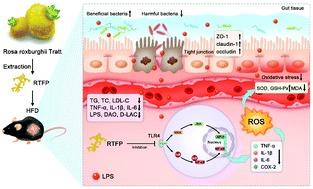A polysaccharide from Rosa roxburghii Tratt fruit attenuates high-fat diet-induced intestinal barrier dysfunction and inflammation in mice by modulating the gut microbiota†
Abstract
Obesity-induced colonic inflammation-stimulated colitis is one of the main causes of colorectal cancer. Dietary polysaccharides are considered an effective agent for relieving obesity-induced inflammatory diseases such as diabetes and colitis. In this work, the protective effects of a polysaccharide (RTFP) extracted from Rosa roxburghii Tratt fruit on barrier dysfunction and inflammation were investigated using obesity-induced colitis model mice. RTFP treatment repaired intestinal barrier dysfunction by increasing the expression of tight junction proteins (ZO-1, claudin-1, and occludin) and reducing the levels of inflammatory cytokines, intestinal permeability, and colonic oxidative stress in mice fed a high-fat diet. Most significantly, RTFP decreased gut inflammation and ameliorated the metabolic dysbiosis of intestinal microflora by decreasing the Firmicutes/Bacteroidetes ratio, reducing the levels of serum D-lactic acid and lipopolysaccharides, and inhibiting the TLR4/NF-κB signaling pathway. Furthermore, RTFP significantly increased the abundance of beneficial bacteria (Ruminococcaceae, Muribaculaceae, Akkermansiaceae, etc.) but decreased the abundance of pathogenic bacteria. These findings indicate that RTFP can be used as a natural anti-inflammatory agent to reduce chronic obesity-induced colitis.



 Please wait while we load your content...
Please wait while we load your content...